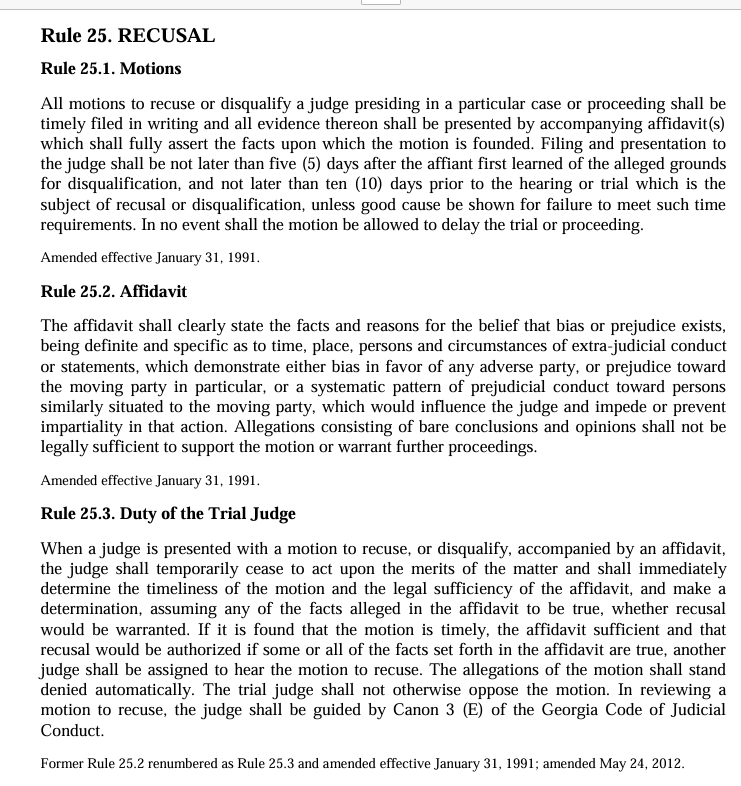So let's talk for a minute about recusal motions in Georgia, how they work, and what the remedies are. A valid recusal motion in Georgia must be: 1. Swift 2. Sworn 3. Sufficient /1

The motion must be swift: You have to file it within 5 days of learning whatever reason you have for wanting the judge recused. /2
The motion must be sworn: With the motion, you have to file an affidavit describing the facts you have learned that make you worry that the judge has a bias. /3
The motion must be sufficient: The facts must be enough to lead a reasonable person to believe that the judge is biased against you. You can almost never base that belief on the judge's rulings against you, or on your own bad behavior regarding that judge. /4

What sort of thing is sufficient? The big one is responding to a recusal motion by disagreeing with the facts presented in that motion. This, standing alone, is recuseable. /5

Another valid basis for recusal is continuing, over-the-top rudeness to counsel in front of a jury. For instance, telling a lawyer to "sit down and shut up" when he tries to make an objection. /6

Yet another valid basis is having an ex parte meeting with a prosecutor to discuss the testimony of a particular witness, and coaching that prosecutor on how to proceed. /7

If a motion to recuse is "sufficient," which is to say, if it would require recusal if you assume everything in it is true, then you are entitled to have another judge rule on the motion to recuse. /8

What happens if a judge refuses to reassign the case to another judge to determine the merits of the recusal motion? If the motion is a slam dunk, everything after the recusal motion is erased. If it's debatable, you have a hearing in front of another judge. /9


And if that judge says that the motion to recuse was valid, then you erase everything that followed. That usually means starting a case from scratch. /10
There is one other scenario where recusal is required as a matter of law: contempt proceedings. When a lawyer messes up in open court, everyone is watching, and the judge must act immediately to restore order, that is summary contempt. The trial judge can do that. /11

So imagine, for instance, that in the middle of trial, a lawyer flagrantly displays a piece of excluded evidence to the jury, knowing full well he is in violation of a court order. That can justify immediate jail, after a chance to explain. /12
But if a judge is not required to respond immediately, let's say because the jury is not present, or there is ample time to decide the issue, or the contempt did not occur in open court, then another judge must rule on the contempt issue. /13

Why must another judge rule? Because a contempt finding is going to require credibility findings, and a judge in a contempt action is acting as a prosecutor. Due process requires neutrality. /14
So in Schoolcraft, a defense lawyer lied to a judge about whether his client had wielded a pipe. The judge was furious, and demanded a contempt hearing. The COA held that, with intervening time, a new judge was required, even though bad behavior in open court. /15


How would these standards apply in the YSL trial? Well, first, Glanville has acknowledged that the motions to recuse are both swift and sworn. He argues only that they are insufficient, because based upon his "rulings." He cites Baptiste for this. /16
But the recusal motions do not actually mention any rulings by the trial court judge. They cite that the judge has chastised defense counsel in front of the jury, that he had an ex parte meeting, and that he responded to being accused of bias for that meeting with contempt. /17
In case after case after case, courts have not treated those sorts of things as "rulings." A ruling based recusal motion might say that a judge is biased for denying every defense motion, or that he made the wrong credibility findings at a motion to suppress. /18
But ex parte meetings with prosecutors and witnesses, arguing facts with counsel, threatening that claims of bias are unethical, these things are not rulings. They are traditional bases for arguing recusal. /19
If we leave things where they are, then the parties may not get any relief until appeal. At that point, if a court finds that recusal is necessary, the convictions for each defendant will be vacated, and a new trial will be required. /20
But defendants may also be to file what is known as a "mandamus" action. A mandamus is a way of requiring public officials in Georgia to do something they have no discretion over. For instance, Judges have to grant bond after 90 days. You can mandamus them to do so. /21

The mandamus statute says that you cannot demand removal of a judge unless a motion to recuse has been filed, or where another judge has denied a motion to recuse. That suggests that you can mandamus recusal where a judge has refused a facially sufficient motion. /22

As it stands, I think most attorneys now agree that if the State of Georgia secures a conviction in the YSL trial, it will almost certainly be reversed on appeal by the Supreme Court of Georgia. But it may still be salvageable. With the right judge. /end
